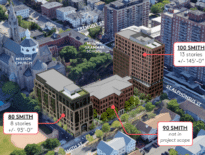Language shielding lenders of an unusual type of mortgage from lawsuits got included in the major economic development bill that passed the Massachusetts Legislature this week over the objections of the state’s biggest mortgage-lender trade group.
The Massachusetts Mortgage Bankers Association opposed the move, saying it’s concerned that consumer rights are being infringed upon and that regulatory oversight of so-called “shared appreciation mortgages” is needed.
“The entity and the maker, lender, grantor or holder of the new first priority mortgage loan shall not be liable for monetary relief, injunctive relief or other equitable relief at common law or by statute, including chapter 93A, chapter 140D, chapter 183C and section 49 of chapter 271 for the use of or the terms of said shared appreciation mortgage or shared appreciation promissory note, so long as such person receives a full disclosure,” the bill states.
MMBA told legislators it’s concerned by the idea that consumers would not be able to seek financial compensation in the courts, even if the consumer wasn’t aware of the ramifications of a shared appreciation mortgage.
“On average, consumers typically receive over 40 documents totaling over 150 pages at a loan closing. To waive regulatory oversight and consumer protections based upon receiving one specific disclosure in a sea of so many other disclosures is negligent,” the trade group wrote in a letter to lawmakers this summer.
A shared appreciation mortgage is a lending product typically offered to homeowners facing foreclosure and financial distress. Under such an agreement, a homeowner agrees to give a lender or entity a share of any increase in the value of their home. Depending on how the property value changes over time, the lender’s share might exceed the balance owed on the loan. The consumer agrees to forfeit a portion of future gains, which the lender collects when the loan is repaid, either through the sale of the home or if the consumer opts to refinance the mortgage.
MMBA members don’t offer shared-appreciation mortgages, the association says.
BlueHub Capital is one of the Massachusetts’ highest-profile originators of shared appreciation mortgages. It says it’s used them to help homeowners stay in their homes in cases of foreclosure but also is in the middle of a court battle with some of its borrowers upset by the profits BlueHub was able to make on their homes.
“We appreciate the sponsors of this amendment and members of the Conference Committee for including this critical initiative in the final version of the economic development legislation,” the nonprofit lender said in a statement. “This legislation will ensure that foreclosure relief programs like BlueHub SUN remain accessible to families who are facing imminent danger of losing their homes.”
The company says that its BlueHub SUN product has put more than $65 million in home equity back into homeowners’ pockets, with $45 million in Massachusetts alone. Without its shared appreication product, BlueHub said these borrowers would have lost their homes due to foreclosure.
BlueHub has provided 558 loans to families across the state and said on overage that homeowners save $734 per month on their mortgage payment and their mortgage principals are reduced by an average of $91,000, or 31 percent.
“BlueHub SUN clients are significantly better off through their participation in the program,” the lender said. “First, they get to keep the home they would have otherwise lost to foreclosure. Second, they now have more equity than their neighbors who did not participate in the SUN program. Those neighbors, if they were able to keep their homes by taking on second jobs or other means, have much less equity today than SUN homeowners, including the plaintiffs. More than 400 families—42% of SUN clients—have successfully exited the program with an average of $150,000 in home equity. Almost all of those 400 families had zero or negative equity in their homes when they entered the SUN program.”
The law heads to Gov. Maura Healey’s desk for her signature or veto.







